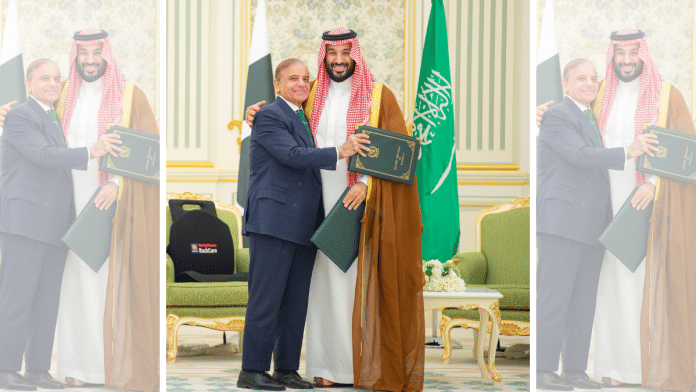New Delhi: Pakistan and Saudi Arabia have signed a formal Strategic Mutual Defence Agreement (SMDA) which declares that “any aggression against either country shall be considered an aggression against both.”
The defence pact comes amid heightened tensions between New Delhi and Islamabad following the Pahalgam terror attack in April and Operation Sindoor launched by India in May.
It also comes at a time when Gulf states are questioning the reliability of the United States as their main security guarantor, concerns that grew after Israel’s 9 September strike on Doha.
Just two days before the defence pact was signed, the Arab League and the Organisation of Islamic Cooperation (OIC) held a joint session and condemned Israel’s attack.
On Thursday, India responded saying it would take all necessary steps to “protect national interests” and ensure comprehensive security across all domains.
In the aftermath of the newly signed SMDA reinforcing decades of military, strategic and cultural ties between Pakistan and Saudi Arabia, ThePrint looks at the long-standing relationship between the two nations which began in 1967.
Also Read: ‘Foreign policy rests on hard power’—from 1965 Indo-Pak war to Op Sindoor, key takeaways for India
A long arc of strategic ties
Beyond providing Pakistan with financial aid and loans, Riyadh has maintained close defence ties with Islamabad for over six decades, built on formal agreements, troop deployments, training programmes and arms cooperation.
The partnership began in 1967 with the signing of their first security cooperation pact, which enabled Pakistan to provide military advisers and pilots to the Kingdom. This collaboration became visible in 1969, when Pakistan Air Force (PAF) pilots flew Saudi jets during the Al-Wadiah conflict against South Yemen.
The relationship deepened further after the 1979 seizure of the Grand Mosque in Mecca, when Pakistani special forces assisted Saudi troops in reclaiming the shrine from militants.
Ties strengthened again following the Iranian Revolution in 1978 and the Soviet invasion of Afghanistan in 1979, leading to a protocol agreement that allowed Pakistani forces to be stationed in Saudi Arabia.
By 1982, the defence partnership was formalised through a protocol permitting large-scale Pakistani troop deployments. At its height, more than 15,000 Pakistani soldiers were stationed in the Kingdom, tasked with protecting key sites, including Mecca and Medina.
Moreover, during the 1990-91 Gulf War, Pakistan sent additional troops to Saudi Arabia to help protect its territory from potential Iraqi attacks. This sustained presence built a tradition of Pakistani forces serving in the Kingdom, with smaller contingents continuing through the 1990s and 2000s.
Defence cooperation also included intelligence exchanges, with both sides regarding each other’s security as closely intertwined.
Another dimension that has long drawn attention is speculation about Saudi funding for Pakistan’s nuclear programme. Since the 1970s, multiple western intelligence reports and books have suggested that Riyadh provided financial support to Islamabad’s nuclear ambitions in return for a future security guarantee.
For instance, retired Pakistani Brigadier Feroz Hassan Khan, in his book, ‘Eating Grass: The Making of the Pakistani Bomb’, said that Riyadh had extended “generous financial support” to Pakistan’s nuclear programme.
A 2007 US diplomatic cable released by WikiLeaks recorded American diplomats relaying that their Pakistani counterparts had raised the idea of Saudi Arabia pursuing a weapons programme alongside Islamabad.
Pakistan’s nuclear tests in 1998 were followed by Saudi financial assistance, including deferred oil payments that helped cushion the impact of international sanctions, further fueling such claims. Nonetheless, both countries have consistently denied any formal nuclear arrangement.
Arms trade is another important element of the relationship. Saudi Arabia has consistently been one of the largest importers of Pakistani small and medium weapons, with state-owned Pakistan Ordnance Factories securing contracts worth tens of millions of dollars.
Training programmes and joint exercises have been central pillars of their partnership. Since the 1970s, thousands of Saudi officers and cadets have graduated from Pakistani military academies. Joint exercises that began in the early 1990s, such as the Naseem al-Bahr naval drills, the Al-Samsaam land forces exercise and special forces drills like Al-Shehab and Al-Battar, have been conducted regularly.
In 2005, the two countries renewed their military cooperation agreement, further expanding training and exchange programmes. Cooperation also extended to multinational initiatives such as in 2017 when former Pakistan Army chief Raheel Sharif was appointed to lead the Saudi-based Islamic Military Counter Terrorism Coalition.
(Edited by Tony Rai)
Also Read: ‘Loyal wingman’ to full ICBM triad & air defence, China’s show of power at Victory Day parade






